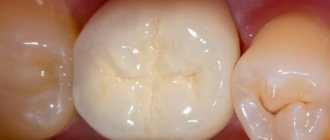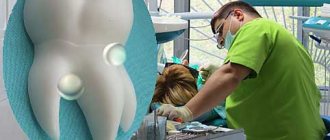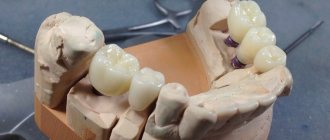After installing a prosthesis (in most cases a crown), unpleasant symptoms can be detected. This is pain, discomfort, swelling, the sensation of a foreign body in the oral cavity, and even suppuration of the tooth. This is due to improper installation of the prosthesis or independent diseases of periodontal tissue. If the material is incorrectly selected, an allergic reaction may develop. Vulture, itching, redness, and swelling appear on the mucous membrane. The troubles don't end there.
It often happens that a removable denture is installed incorrectly by the dentist or by the patient himself after cleaning. This does not mean the doctor is unprofessional; it happens that after orthopedic treatment, the tooth is injured or the enamel cracks. The reason for this may be injuries, biting hard objects, bad habits - holding a needle or coffee bean in your teeth, thread (these are more likely professional bad habits). All this cannot go unnoticed and both the jaw itself and the installed prosthesis suffer. Any complication after prosthetics can be associated with external or internal irritants, but each time it is accompanied by minor or severe pain.
Why does inflammation begin under the prosthesis?
At the present stage of orthopedic treatment, all materials are so carefully selected that the risk of complications is reduced to a minimum. But everything has its exceptions.
Poor canal filling before prosthetics is a mistake not of the orthopedist, but of the therapist. Incomplete filling of the tooth canal leads to the entry of unfavorable microflora into it, which multiplies and provokes inflammation of periodontal tissue. The patient feels pain, swelling at the site of the installed prosthesis, and pulsation. In this case, it is extremely necessary to re-treat and reinstall the prosthesis.
Inflammation may occur under a fixed prosthesis or crown if an instrument is left in the canal during treatment or the canal wall is perforated. In any case, 95% of complications are associated with improper root canal treatment.
A carious cavity under the prosthesis is a complication of prosthetics and is also associated with improper preparation for prosthetics. Caries under a denture develops in two cases: incomplete removal of carious tissues and non-compliance with the rules of sealants during prosthetics. When there are holes for food debris to penetrate, it always leads to the formation of plaque and caries.
How to get rid of pain
The most common problem when putting removable structures into the oral cavity is pain that occurs as a result of the gums becoming unaccustomed to the loads of chewing. It is important to understand that pain is normal in this situation and will go away as soon as the gums get used to the stress of chewing food.
The first and most effective way to relieve spasms and pain is to use painkillers. Nonsteroidal anti-inflammatory medications usually help.
To reduce the pain threshold after installing dentures, dentists advise patients not to eat foods that are difficult to grind for the first 3-5 weeks. Removable dentures for the front teeth usually do not cause adjustment problems, since the pressure on them is minimal.
To get used to it as quickly as possible, you should perform a daily gum massage, which consists of gradually increasing pressure on the sore area of the gum with your fingers for several minutes a day.
How to identify complications after installation of a prosthesis?
If there are doubts about the normal state of the mucous membrane under the prosthesis, you need to pay attention to several specific manifestations.
Swelling of the gums is a sure sign of the onset of the inflammatory process. The accumulation of purulent exudate under the gum can lead to serious consequences, and in this case you need to contact a dental surgeon. Swelling or gumboil can cause not only pain, but also tooth mobility, and this will lead to the need to replace the denture.
Fistula - acute inflammation of periodontal tissues can result in gumboil. And if the acute period of the complication went unnoticed, then the appearance of a fistula cannot be missed. If the fistula closes, acute inflammation begins again.
Cyst - if adequate treatment of chronic periodontitis was not carried out before prosthetics, it will end with a cyst. The cyst contains pus and appears on an x-ray as a black spot. The symptoms of a cyst are similar to periodontitis - pain when biting, swelling in the area of the causative tooth.
Main problems
When installing inserted implants, many patients initially describe the following symptoms:
- Pain when putting on and taking off the denture, chewing and swallowing;
- Rubbing the upper and lower palatal arch;
- Inability to chew food properly
- Excessive secretion of saliva into the oral cavity;
- Violation of normal pronunciation of sounds and words;
- Distortion of taste sensations.
It is important to eliminate these symptoms in the first weeks after putting on the structure. Therefore, dentists recommend not removing the denture in the first 2-3 weeks after its manufacture.
What to do if there is inflammation under the prosthesis?
The first thing to do is contact your doctor or, better yet, go to a good dental clinic that will offer several treatment options.
If prosthetics involves installing a pin, treatment becomes more complicated, since removing it from the root canal is quite difficult and can result in a root fracture. After this, the tooth will have to be completely removed. The issue of repeated prosthetics is quite complicated, since a root fracture can damage the bone plate and the implant cannot be installed, just like any pin.
When the cause of a complication after installing a crown is improper treatment of the canals, again the refilling is difficult and may result in perforation.
When it is possible to unseal the canal or remove the pin, anti-inflammatory therapy is carried out. After this, the canals are re-filled and a new prosthesis is installed.
We can conclude that it is better to carry out painstaking preparation for prosthetics and take into account all possible complications before installing the prosthesis, rather than treating the resulting inflammation.
Infections and problems with dentures
Dentures can be an excellent solution for tooth loss. Today, dentures, also called false teeth, are nothing like what your grandmother used. They are more comfortable and look more natural than in the past. However, if you don't take proper care of your dentures, problems can arise.Dental Daily reviews common problems associated with dentures and how they can be treated or prevented.
Common problems associated with dentures
If you wear dentures, it is important to keep your mouth clean and healthy. You should also only wear dentures that do not cause discomfort, otherwise it may cause the following problems:
- Irritation of the gums and oral cavity;
- Problems with eating and speaking;
- Shift of dentures;
- Oral infections.
Treatment of problems associated with installed dentures
If you have problems with your dentures, contact your dentist immediately. You may need to have your denture adjusted or replaced. Here are some ways to treat various denture problems:
- Make sure your dentures fit you well. Over time, bones and gums can change, making wearing dentures uncomfortable. If this happens, you will need to have them repaired, altered, or replaced by a dentist. Never try to adjust dentures yourself.
- Speak slowly. When the denture is first installed, it may be somewhat difficult to pronounce some words. Be patient. Practice saying difficult words out loud and slowly. If you feel your dentures move when you laugh or smile, gently bite and swallow to move them back into place.
- Eat soft foods. If you have trouble eating, follow these tips: - Eat small, soft foods, such as eggs or yogurt; - Don't eat anything sticky; - Chew your food slowly; - When chewing, use both sides of your mouth at the same time. This prevents the prosthesis from sliding forward or being dislodged;
- Once you get used to your dentures, eating will become much easier. After a while we will be able to eat almost everything.
Use denture adhesive. Denture adhesive will help keep dentures securely in place, but should not be used to attach old or loose dentures. When using denture adhesive, follow the instructions carefully. Try not to use more than you need.
Oral infections associated with dentures
Heiloz . Also called cheilitis, a painful infection that causes inflammation and cracks in the corners of the mouth.
This infection is caused by an overgrowth of yeast that can accumulate in moist areas of your mouth when dentures are not properly fitted.
To prevent cheilosis, visit your dentist regularly to ensure that your dentures are fitted correctly. Also try not to rub or lick the corners of your mouth.
Stomatitis. This is another type of infection that is caused by yeast overgrowth. You may not even know that you have canker sores from wearing dentures, as the symptoms are often subtle. When they do appear, you may see small red bumps on the roof of your mouth or redness throughout your mouth, especially under your upper dentures.
Cheilosis and stomatitis can be treated with medication and proper denture care.
Caring for your dentures
Making sure your dentures are fitted correctly is not enough, taking care of your dentures is also very important. Here are some tips to help your dentures last longer and look their best:
- Never sleep with dentures. Your dentist may advise you to sleep with your dentures on for a while immediately after they are fitted to allow your mouth to adjust to them. This is the only case when you can sleep with dentures installed.
- Handle dentures with care. Dentures are very fragile and can break easily. While holding your dentures, lean over a sink filled with water or place a towel on the edge. This way, you can protect your dentures in case you accidentally drop them. Also keep dentures out of the reach of children and pets.
Clean your dentures every day. Here are some tips for caring for them:
- Soak your dentures in denture liquid at night.
- Clean them thoroughly every morning before placing them in your mouth.
- Use a soft-bristled brush or a denture-specific brush.
- You can usually use soap and warm water, or ask your dentist to recommend a denture fluid.
- Never use powder cleaners or bleach your dentures.
- Brush your mouth every day. Clean and massage your gums, tongue and roof of your mouth before getting dentures. This will help maintain oral health.
- Store dentures properly. If you do not wear dentures, store them in a special solution or warm water. Do not use hot water - it can cause deformation of your dentures.
- Don't use toothpicks. Toothpicks can damage your dentures.
Wearing dentures is very uncomfortable at first, and it may take some time before you get used to them. But you can prevent problems with your dentures by taking proper care of them and visiting your dentist regularly every six months for checkups. If you notice changes in the installation of dentures, or other problems with the oral cavity, contact your dentist immediately.
Fitting, installation and training in use
How long does it take to install dentures? This depends on the type of orthopedic structure. On average, production takes 1-2 weeks if the clinic has its own laboratory. Third-party manufacturing will take the same amount of time, but add another 1-2 weeks for transporting the structure to the clinic for fitting. Do not skip fittings and tell the doctor about any inconveniences - this will ensure a tighter fit of the base to the prosthetic bed. Installing a finished prosthesis on a patient will take about 1 hour (this may include training on how to clean and wear it).
What to do if your gums are rubbing
It is worth noting that after the first fitting and installation of a removable denture, as well as after the first days of wearing, the patient may notice a certain feeling of pressure in the gum area. As a rule, problems do not arise if a removable denture was installed for 1 tooth or a bridge was installed. Dentists assure that this is the norm, since the body responded to a foreign object, and the gums became slightly inflamed. After getting used to it, the swelling will gradually go away and the implants will be normal again.
To relieve inflammation in a short time, dentists advise rinsing your mouth with chamomile or string, calendula or aloe. Such plants help soothe tissue. It is also necessary to limit the consumption of foods that can cause irritation to the oral cavity and mucous membranes.
It is important to understand that in the case of a prolonged inflammatory process, it is worth contacting the dentist to check the correct choice of shape and size of the structure, and also, if necessary, make adjustments to the prosthesis.
Restoring chewing function
Many patients, after a long absence of teeth in the mouth, cannot get used to the fact that removable teeth can be used completely for their intended purpose. This leads to patients relearning how to chew food.
To solve this problem, you should not bite off large pieces of food for a while, chewing each piece thoroughly. Also, you should not bite off hard foods for a long time until you get used to the new devices.
You need to get used to chewing on both sides of your teeth alternately so as not to overload your gums.
Solving the problem of drooling
Another frequently asked question among patients with false teeth is excessive drooling from the mouth. This condition is caused by the presence of a foreign body in the oral cavity, which provokes the receptors. To a greater extent, the condition occurs when a removable plate prosthesis is installed.
There is no need to control this process - after a few weeks, the body’s reaction weakens and the salivation process returns to normal. As a preventive measure and habituation, you can drink large amounts of plain water.
Problems pronouncing words and sounds
It is important, after the general condition of the tooth has become accustomed to the presence of dentures, to begin working with diction, since it is impaired in 70% of cases.
In order to eliminate problems with the pronunciation of sounds, dentists advise talking in front of a mirror, pronouncing various words with sounds that are difficult to perceive.
Difficult phrases and tongue twisters, as well as pronouncing words out loud, will be a good help.
Food perception
| Click to sign up for a FREE consultation |
Adaptation to removable dentures occurs, as a rule, without loss of taste, however, a third of patients during the period of adaptation note a decrease in the perception of taste buds.
It is important to adjust the psychological level in order to get used to the new sensation of tastes. Many dentists advise trying every bite of food, trying to feel its taste.
This activity helps not only restore receptor function, but also learn to eat food correctly.
The process of wearing dentures and adapting to them is quite complex, so it is important to adjust yourself on a psychological and physical level. In the first weeks after installation of a removable denture, you must try to follow all the doctor’s instructions in order to adapt your body quickly and painlessly.
Why is it more difficult to get used to a complete removable denture on the lower jaw?
The upper complete removable denture, due to its shape and anatomical features of the upper jaw, sticks to the palate and holds quite well.
People have little trouble fixing it. The greatest difficulty in getting used to is the lower complete removable denture. This is due to the fact that when not a single tooth is missing, there is a difficult fixation of this prosthesis on the lower jaw. The lower complete removable denture cannot adhere to the lower jaw, it simply lies on it.
The situation is further aggravated by the fact that the tongue is attached to the lower jaw. As the jaw moves, this powerful muscle begins to move and releases the denture. The masticatory muscles are also attached to the lower jaw, which at the moment of chewing also begin to move, move the mucous membrane and try to remove the denture. In addition, the anatomical complexity of the mucous membrane on the lower jaw complicates the adaptation and fixation of a removable denture, since it is looser, softer and less attached to the bone compared to the upper jaw.









